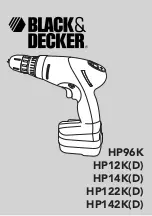
8
Know your tool
◆
Warning! When using battery-powered
tools, basic safety precautions,
including the following, should always
be followed to reduce the risk of fire,
leaking batteries, personal injury and
material damage.
◆
Read all of this manual carefully before
operating the tool.
◆
Before operating the tool, make sure
that you know how to switch the tool off
in an emergency.
◆
Retain this manual for future reference.
General
1. Keep work area clean
Cluttered areas and benches can cause
accidents.
2. Consider work area environment
Do not expose the tool to rain. Do not use the
tool in damp or wet conditions. Keep the work
area well lit. Do not use the tool where there is
a risk of causing fire or explosion, e.g. in the
presence of flammable liquids and gases.
3. Keep children away
Do not allow children, visitors or animals to
come near the work area or to touch the tool.
4. Dress properly
Do not wear loose clothing or jewellery, as these
can be caught in moving parts. Preferably wear
rubber gloves and non-slip footwear when
working outdoors. Wear protective hair
covering to keep long hair out of the way.
5. Personal protection
Always use safety glasses. Use a face or dust
mask whenever the operations may produce
dust or flying particles. Wear ear protection
whenever the sound level seems
uncomfortable.
6. Do not overreach
Keep proper footing and balance at all times.
7. Stay alert
Watch what you are doing. Use common sense.
Do not operate the tool when you are tired.
8. Secure workpiece
Use clamps or a vice to hold the workpiece.
It is safer and it frees both hands to operate
the tool.
9. Connect dust extraction equipment
If devices are provided for the connection of
dust extraction and collection facilities, ensure
that these are connected and properly used.
10. Remove keys and adjusting wrenches
Always check that keys and adjusting wrenches
are removed from the tool before operating
the tool.
11. Use appropriate tool
The intended use is described in this instruction
manual. Do not force small tools or attachments
to do the job of a heavy-duty tool. The tool will
do the job better and safer at the rate for
which it was intended. Do not force the tool.
Warning!
The use of any accessory or
attachment or performance of any operation
with this tool other than those recommended
in this instruction manual may present a risk of
personal injury.
12. Check for damaged parts
Before use, carefully check the tool for
damage. Check for misalignment and seizure
of moving parts, breakage of parts, damage to
guards and switches and any other conditions
that may affect its operation.
Ensure that the tool will operate properly and
perform its intended function.
Do not use the tool if any part is damaged or
defective.
Do not use the tool if the switch does not turn
it on and off. Have any damaged or defective
parts repaired or replaced by an authorised
repair agent. Never attempt any repairs yourself.
13. Remove the battery
Where the design permits, remove the battery
when the tool is not in use, before changing
any parts of the tool, accessories or
attachments and before servicing.
14. Avoid unintentional starting
Do not carry the tool with a finger on the
on/off switch. Be sure that the tool is switched
off when inserting the battery into the tool.
15. Do not abuse cord
Never carry the charger by its cord or pull it to
disconnect from the socket. Keep the cord
away from heat, oil and sharp edges.
E N G L I S H
Summary of Contents for HP122K(D)
Page 1: ...1 HP96K HP12K D HP14K D HP122K D HP142K D ...
Page 3: ...3 A 9 10 7 4 5 6 11 15 14 3 2 1 12 13 8 ...
Page 4: ...4 13 15 14 9 C B D E 10 9 16 17 18 9 11 12 ...
Page 5: ...5 G F H 20 19 3 21 J 5 I 22 2 ...
Page 6: ...6 24 23 K ...
Page 99: ...99 ...
Page 100: ...100 ...
Page 101: ...101 ...









































